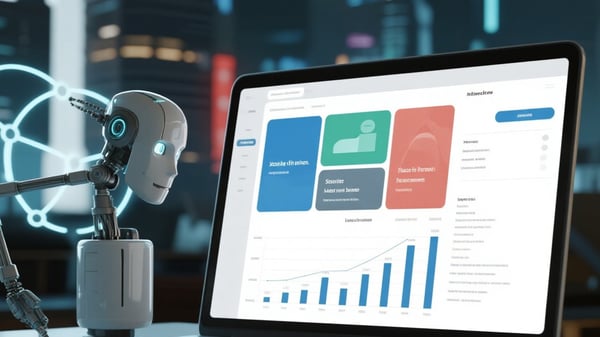How AI Is Transforming Online Marketing Strategies

In today's digital age, marketers face the challenge of standing out amongst vast online competition. Artificial Intelligence (AI) is reshaping how businesses approach their marketing strategies, enhancing customer experiences, and increasing efficiency. This article will explore various aspects of online marketing AI: its role in personalization, automation, data analysis, content creation, the customer journey, and ethical considerations. Each section aims to provide insight into how AI can impact marketing effectiveness and what businesses need to consider when implementing these technologies.
The power of personalization
Personalization has become crucial in online marketing. Consumers today expect content and advertisements tailored specifically to their interests and preferences. AI algorithms analyze user data such as web browsing history, purchase behaviors, and social media interactions to create targeted marketing messages.
For instance, recommendations seen on platforms like Amazon and Netflix are powered by AI-driven systems. These systems analyze user behavior and preferences, suggesting products or shows especially suited to each individual. In one study, retailers using personalized marketing reported a 20% uplift in sales, proving that tailored messaging drives customer engagement and conversions.
Moreover, businesses can use AI to deliver personalized emails, optimize landing pages, and create dynamic advertisements that adjust in real-time based on user interaction. Such personalization not only increases customer loyalty but can also reduce the cost of customer acquisition.
Automation in marketing campaigns
AI has the ability to automate various marketing tasks, allowing teams to focus on strategy and creativity. Automation can include the scheduling of social media posts, managing email marketing campaigns, and analyzing data for insights.
Marketing automation platforms like HubSpot and Marketo use AI to optimize campaigns by identifying the best times to reach audiences, segmenting lists based on user behavior, and crafting personalized messages. Reports show that automation can increase productivity by 20%, giving businesses more time to innovate and engage with customers.
Furthermore, chatbots powered by AI can handle customer inquiries in real-time, ensuring that users receive immediate support. These chatbots can learn from interactions to improve their responses and become increasingly efficient over time, enhancing customer satisfaction and reducing operational costs.
Data analysis and insights
One of the standout benefits of AI in online marketing is its ability to analyze vast amounts of data quickly and accurately. This capability allows marketers to gain valuable insights into consumer behavior, preferences, and trends, ultimately informing strategy decisions.
AI-driven analytics tools can track metrics like engagement rates and conversion rates across different platforms, offering predictions on future performance. For example, Google Analytics utilizes AI features to help businesses make informed decisions based on historical data and user behavior patterns. Marketers can then adjust campaigns in real-time to improve results.
Additionally, predictive analytics can help businesses forecast customer behavior. This means that companies can proactively target consumers with specific offers, increasing the likelihood of conversions. By leveraging AI, marketers can reduce guesswork and base their strategies on data-driven decisions.
Content creation: A new frontier
Creating engaging content can be time-consuming, but AI tools are now stepping in to streamline the process. Through natural language processing (NLP), AI can generate written content, such as headlines, product descriptions, and even entire articles. Tools such as Jasper and Copy.ai use AI to help marketers produce high-quality content efficiently.
While AI-generated content is impressive, it's essential to balance it with human creativity. Marketers should view AI as an assistant rather than a replacement. The synergy between human insights and AI efficiency can lead to compelling narratives that resonate with targeted audiences, driving engagement and leading to higher conversions.
Moreover, AI technology can assist in optimizing existing content by analyzing which pieces perform best, suggesting keywords, and helping in audience targeting. By utilizing AI, content marketers can create relevant and impactful materials that enhance their overall strategies.
Enhancing the customer journey
AI enhances every stage of the customer journey by providing valuable insights and improving user experiences. From the initial discovery to post-purchase follow-up, AI-driven tools can guide consumers through the buying process seamlessly.
For example, during the discovery phase, AI can help businesses understand what customers are searching for and serve tailored ads that capture attention. During the decision phase, chatbots can provide quick support and recommendations to guide users toward conversions. Following a purchase, AI algorithms can suggest additional products, enhancing the customer’s experience and leading to repeat sales.
Personalization throughout the customer journey has proven to improve retention rates by up to 50%. Companies that strategically use AI tools to understand and enhance the customer journey will likely see increased engagement, loyalty, and ultimately sales.
Ethical considerations of AI in marketing
While the benefits of AI in marketing are substantial, ethical considerations must also be addressed. As AI tools collect vast amounts of data for personalization, concerns regarding privacy, data security, and consent arise. Marketers must ensure a transparent approach towards data usage, providing users with clear information on how their data will be employed.
Moreover, biases in AI programming can inadvertently lead to discriminatory practices. Businesses should prioritize diversity in their AI development teams and input processes to ensure fair and inclusive marketing practices. As an example, companies should be cautious about how AI algorithms target specific demographics, ensuring that their strategies align with ethical standards.
Establishing ethical guidelines around AI usage in marketing will foster consumer trust while allowing businesses to successfully navigate the technology's complexities. Transparency, accountability, and inclusivity should remain at the forefront of AI marketing strategies.
Artificial Intelligence is undoubtedly revolutionizing the landscape of online marketing. From personalized experiences to efficient automation, AI is equipping businesses with innovative tools to engage with consumers effectively. As companies continue to leverage AI technologies, they must also remain mindful of ethical considerations surrounding data use and customer privacy. By doing so, they can create impactful marketing strategies that foster both high performance and customer trust. Embracing this transformation can lead to improved operational efficiency, enhanced customer satisfaction, and a competitive edge in the ever-evolving marketplace.